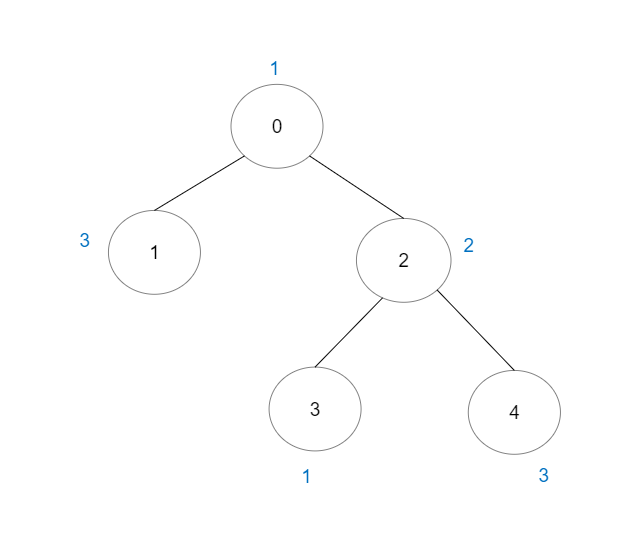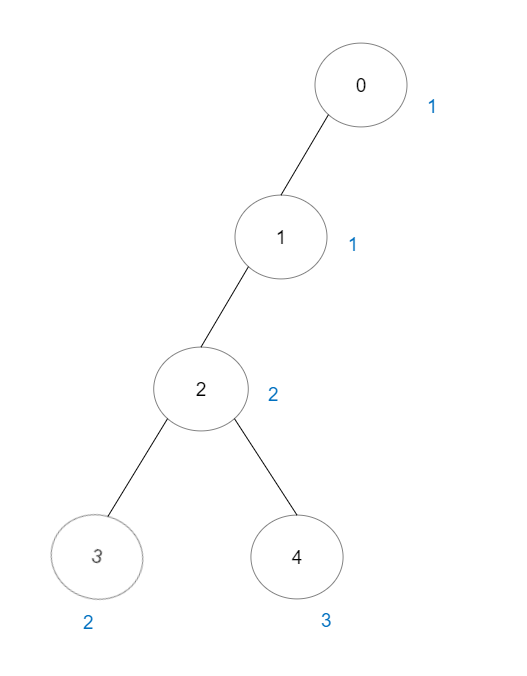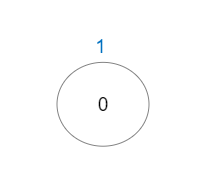Problem
There is a tree (i.e. a connected, undirected graph with no cycles) consisting of n nodes numbered from 0 to n - 1 and exactly n - 1 edges.
You are given a 0-indexed integer array vals of length n where vals[i] denotes the value of the ith node. You are also given a 2D integer array edges where edges[i] = [ai, bi] denotes that there exists an undirected edge connecting nodes ai and bi.
A good path is a simple path that satisfies the following conditions:
The starting node and the ending node have the same value.
All nodes between the starting node and the ending node have values less than or equal to the starting node (i.e. the starting node's value should be the maximum value along the path).
Return the number of distinct good paths.
Note that a path and its reverse are counted as the same path. For example, 0 -> 1 is considered to be the same as 1 -> 0. A single node is also considered as a valid path.
Example 1:

Input: vals = [1,3,2,1,3], edges = [[0,1],[0,2],[2,3],[2,4]]
Output: 6
Explanation: There are 5 good paths consisting of a single node.
There is 1 additional good path: 1 -> 0 -> 2 -> 4.
(The reverse path 4 -> 2 -> 0 -> 1 is treated as the same as 1 -> 0 -> 2 -> 4.)
Note that 0 -> 2 -> 3 is not a good path because vals[2] > vals[0].
Example 2:

Input: vals = [1,1,2,2,3], edges = [[0,1],[1,2],[2,3],[2,4]]
Output: 7
Explanation: There are 5 good paths consisting of a single node.
There are 2 additional good paths: 0 -> 1 and 2 -> 3.
Example 3:

Input: vals = [1], edges = []
Output: 1
Explanation: The tree consists of only one node, so there is one good path.
Constraints:
n == vals.length1 <= n <= 3 * 10^40 <= vals[i] <= 10^5edges.length == n - 1edges[i].length == 20 <= ai, bi < nai != biedgesrepresents a valid tree.
Solution (Java)
class Solution {
public int numberOfGoodPaths(int[] vals, int[][] edges) {
// Prepare
Node[] nodes = new Node[vals.length];
// Ceate nodes
for (int i = 0; i < vals.length; i++) nodes[i] = new Node(i, vals[i]);
// Assign edges but src has big val
for (int[] edge : edges) {
Node n1 = nodes[edge[0]];
Node n2 = nodes[edge[1]];
if (n1.val > n2.val || (n1.val == n2.val && n1.pos > n2.pos)) n1.edges.add(n2);
else n2.edges.add(n1);
}
int result = 0;
// Sort by node value
Arrays.sort(nodes, (n1, n2) -> n1.val == n2.val ? n1.pos-n2.pos : n1.val-n2.val);
// groups
Map<Integer, Integer> map = new HashMap<>();
int val = nodes[0].val;
int prev = 0;
for (int i = 0; i < nodes.length; i++) {
// Calculate groups when node[i] has bigger val
if (nodes[i].val != val) {
result += count(nodes, map, prev, i);
map.clear();
val = nodes[i].val;
prev = i;
}
// Grow the tree and merge when nodes are connected.
for (Node next : nodes[i].edges) {
Node srcParent = nodes[i].parent();
Node tgtParent = next.parent();
if (srcParent.pos < tgtParent.pos) tgtParent.parent = srcParent;
else if (srcParent.pos > tgtParent.pos) srcParent.parent = tgtParent;
}
}
result += count(nodes, map, prev, nodes.length);
return result;
}
private int count(Node[] nodes, Map<Integer, Integer> groups, int l, int r) {
int count = 0;
for (int i = l; i < r; i++) groups.compute(nodes[i].parent().pos, (k, v) -> v == null ? 1 : v+1);
for (int num : groups.values()) count += num*(num+1)/2;
return count;
}
class Node {
// node position
int pos;
// node value
int val;
// parent of node; Union-Find
Node parent;
// Node with big val to Node with small val
List<Node> edges;
public Node(int pos, int val) {
this.pos = pos;
this.val = val;
this.edges = new ArrayList<>();
this.parent = this;
}
// return parent of this node
public Node parent() {
// If this node is not parent, find its parent and update this.parent;
if (this.parent.pos != this.pos) this.parent = this.parent.parent();
return this.parent;
}
}
}
Explain:
nope.
Complexity:
- Time complexity : O(n).
- Space complexity : O(n).